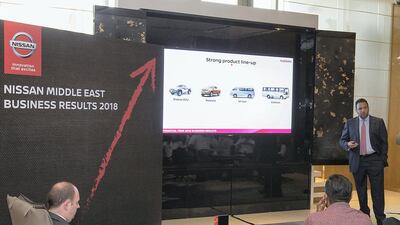Nissan plans to grow its share of the Arabian Gulf's auto market, with a focus on Kuwait and Bahrain, as the region’s governments introduce measures to stimulate their economies.
The Japanese car maker set a target to grow its market share to at least 20 per cent by 2022, up from 16.9 per cent in 2018, Thierry Sabbagh, Nissan Middle East's managing director, said on Wednesday. The firm sees the Gulf auto market stabilising amid government efforts to stimulate regional economies.
"The Middle East is a key pillar for Nissan, it's a focus region," he said. "Today the opportunity is to unlock even further the potential in markets like Kuwait and Bahrain."
The Middle East is an important market for global car makers and Saudi Arabia's decision to reverse a ban on women driving a year ago is expected to spur car sales in the kingdom. Total industry sales across the Gulf (excluding Saudi Arabia) and Mediterranean (made up of Jordan, Lebanon and Syria) dropped 7 per cent year-on-year in 2018, according to Nissan. The firm's retail sales for those regions rose 1 per cent during the period.
The UAE is Nissan's biggest market in the Gulf region (excluding Saudi Arabia, which has a separate unit). The total industry volumes in the UAE declined by 8 per cent in 2018 over the previous year, according to Nissan. The company's volumes rose 2 per cent to more than 50,000 units in the UAE, where its market share reached 20 per cent in 2018.
"Our plan is to become the number one brand in UAE in terms of market share and we're definitely on the way," Mr Sabbagh said.
"We see [that] in the next few months the market will improve," he said. "We are optimistic about the market and the economic stimulus plans put in by the country."
The International Monetary Fund in April projected the UAE's gross domestic product to rise to 2.8 per cent this year, up from 1.7 per cent in 2018. The country has implemented reforms to strengthen and diversify its economy amid a period of lower oil prices.
Nissan is focusing on Kuwait and Bahrain for further regional expansion.
"These are important markets, the industry is quite strong in these markets," Mr Sabbagh said.
Kuwait's auto industry volumes rose 7 per cent in 2018 and Nissan's sales jumped 50 per cent with a market share of 11.1 per cent, it said.
"We have been over the last 12 months putting a lot of focus on this market, making sure we introduce the latest products, working with our dealer partners," he said.
The region's auto industry saw declines in previous years, as sluggish economic growth due to low oil prices and the introduction of VAT took its toll on consumption, but the firm is bullish about 2019.
"Yes the industry declined last year, but we are very confident that the market has stabilised, we have seen some good signs of recovery in Saudi over the last few months and we believe that will have a positive impact on the rest of the region going forward," Mr Sabbagh said.
The Middle East is among the top 10 global markets for Nissan in terms of market share, he said.
Separately, Nissan has ended a joint venture contract with Al Dahana, Mr Sabbagh said. Nissan Gulf is a joint venture between Al Danaha and Nissan Middle East.
Al Dahana is seeking $386 million (Dh550m) in damages from the Japanese firm over a distribution agreement, The Wall Street Journal reported last month. Mr Sabbagh declined to comment on the issue.
"For us what's important is we continue to do the usual business with our partners in Kuwait and Bahrain and that's what we're focusing on," he said. "The decision from the company to ensure we have best strategy in local markets was not to renew the contract and that gives Nissan Middle East the opportunity to directly interact with dealer partners in the market and deliver on best customer experience."
Nissan reported operating profit of ¥318 billion (Dh10.65bn) for the fiscal year to March 2019, down 45 per cent from a year earlier.
It forecast a 28 per cent plunge in its total annual operating profit, putting it on course for the weakest earnings in 11 years as it struggles to turn the page after the ousting of former chairman Carlos Ghosn, who faces four charges of financial misconduct, which he denies.


